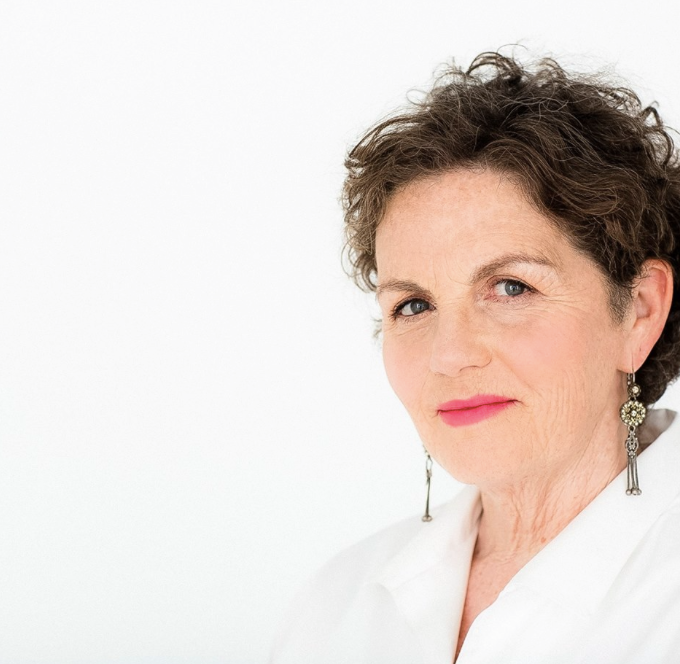We have been lucky enough to get to know Iona over the last couple of months—a sharp, witty and hilarious lady, not to mention a fantastic writer. She is the author of the Lane Winslow series, of which the sixth book, A Deceptive Devotion, was released earlier this year. Iona is an over accomplished woman who has been writing novels and short stories for many years now. We asked Iona to talk about the things that enable her writing process and ignite her creative flare.
What inspired you to write the Lane Winslow mysteries?
I was originally inspired when I went back to visit the house I had lived in as a small child in the tiny community I grew up in along Kootenay lake. My mother loved this house, and I imagined her seeing the house for the first time before she bought it. It was a nostalgic opportunity to both remember the long forgotten community of English fruit growers from the early 20th century, and to create a character with some of the intelligence and truly crazy courage of my mother. And it’s an ideal place to set a murder!
Where, when and how often do you write?
I write every morning, Monday to Friday, sitting comfortably on the bed in our spare room in my fluffy pink bathrobe. I have a little pot of very good English tea, and I write until… I don’t have a specific word count I have to meet… until I feel it is a good stopping place. The word count can truly be anywhere between 500 and 2000 words depending on where I have to be, or if there is a whole scene I want to follow.
Do you construct a timeline of your novels?
Not so much, nor do I pre-plot. One of the characteristics of my books is that they tend to go back and forth in time, with scenes from the past that illuminate the action in the “current” (post war) period. I build my stories on scenes. I almost think of it as a construction with blocks of scenes. Typically when I have a number of scenes that are coming together, I might then stop and do a timeline so that I can clarify things in the book, and even decide if I need to move scenes somewhere else for either better clarity, or, in fact, to hide anything that is becoming obvious too early in the story.
How do you stay inspired when you get a writing block?
I don’t really “do” writer’s block, and I think it is because of my underlying philosophy about what writing is. I have always practiced it, but only when I was teaching high school did I begin to understand the dynamics. My students used to tell me they couldn’t “think” of anything to write, and in the process of working with them, I realized that writing is thinking, and that you can’t possibly know what you think until you write. That freed me as well from the notion that I had to have “ideas” before I could begin writing. This, coupled with the rule I have about never erasing anything during a writing session, means that I find I have something to say every single time I sit down to write. It is very liberating, because what these two things do is allow for maximum creativity to happen, where one idea links to the next one in sometimes very unexpected ways. It’s not to say I always right great stuff… sometimes I write absolute rubbish… but I never don’t write. Typically when I start a project, i.e., a new book, I start with one quite visual scene in my head, and I go from there. I could tell you without equivocation exactly what scene I had in my head before I started each book.
Having said that, I sometimes sit down and I just can’t imagine what comes next after whatever I wrote before. Instead of feeling fatal about it, I simply go to a new scene and begin to write. Something is always going on somewhere in the landscape of the world I’ve created, and I just need to go along and fetch it.
What are the most agonizing aspects of the writing process?
For me the most agonizing aspect of writing is the ups and downs of my opinion about what I’m writing. I will go from feeling very good about something I’ve done, to suffering incredible insecurity about it. There’s not a book I’ve written that at some time I didn’t feel it was absolute rubbish, that my publisher wouldn’t want it, and no one would ever want to read it. I haven’t yet found a real balance where I can judge impartially. It is only after the book has been out for a while and I go back to it that I can more realistically understand both why it is good, and what is flawed about it.
What are the most enjoyable?
Those moments I describe above, where one idea flows to the next. I tend not to think too much, I take risks with wording, and sometimes have to remind myself to just press on, because I won’t know till next day if the wording is felicitous, or just utterly clichéd. I will sometimes re-read something and be amazed that I wrote it. I love the daily surprise, frankly, of finding out what is happening with my characters.
I also love that I can start out the morning with nothing and end up with a decent passage that suggests several other avenues of action. It’s a constant: “Oh, this could happen!” which gives me an impetus for the next day.
I also especially love writing the dialogue. As I’m writing I sometimes sit and listen for what someone might say. I want it to be real. I think a good deal about how we all talk to each other, but even more about how people talked to each other in the period I write about… they were far less tell-ally than we are, so when someone shows a little of who they are it’s a big deal.
Who is your favourite writer, and favourite book?
Argh! So much to choose from. I think my favourite writer is probably P. G. Wodehouse because he is genuinely laugh out loud funny, and was a terrifically tight, disciplined writer. His characters absolutely embody the amusing beleaguered Brit. But Dickens, Austen, Dorothy L. Sayers… I have read all of their works numerous times. Any day I would tell you a different favourite book. Pride and Prejudice, on the one end, and right now a book called The Parisian by Isabella Hamad, which I think just came out last year.
What advice would you give aspiring writers regarding the writing and publishing process?
I always thought getting published was sheer dumb luck, but I learned this: if you’ve written a good book, someone will want to publish it. So that’s the tricky bit, how do you write a good book? And, how do you know if it’s a good book?
There are some things we know about becoming a better writer. It helps to be in a class to start with because there’s the push and discipline, and more importantly, the other eyes on what you are writing. Also, the more you write, the better you get.
I believe very strongly that you should have a small stable of people you really trust to read your manuscript before you send it anywhere, and to tell you the truth about it. I still remember the moment my best friend called up when I’d given her my first manuscript, and said “Oh my God… this is really good!” with an unflattering amount of surprise. That’s when I knew that it may be okay. But that same friend has to say, “The middle of the book sagged, who the hell is so and so? I guessed right away who did it,” and so on. It is critical to be able to step away and not take things personally. Sometimes I will fight to the death for a particular wording, but never when an editor says “This scene makes no sense here, or even at all,” because that person has the goal of making my book a better book.
And of course my two rules above: You really don’t know what the story is till you write it, and, don’t erase on the day you write something. You really want to give the creative process a chance to work…what that really means is that you really want to give your brain a chance to deliver. It won’t do that if you’re trying to second guess yourself as you write. Just write, and then don’t worry about it till the next day. Then I might ask questions like “How is this moving the story forward?” And sometimes it isn’t, but sometimes it is, and you need to trust what you’ve written and discover how it is.
To download the latest version of Granthika, click here.


